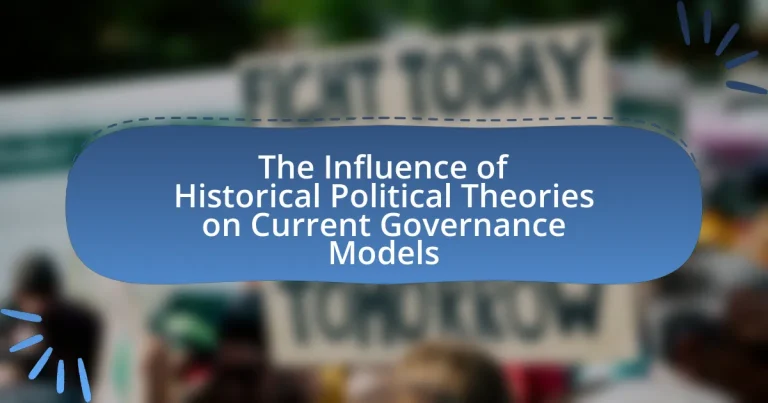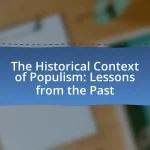The article examines the influence of historical political theories on current governance models, highlighting key frameworks developed by thinkers such as Plato, Machiavelli, and John Locke. It discusses how these theories, including social contract theory, liberalism, and republicanism, have shaped modern political ideologies and governance structures. The significance of these theories is emphasized in their role in informing policy-making, promoting individual rights, and establishing democratic principles. Additionally, the article addresses the challenges of integrating historical theories into contemporary governance and the importance of public discourse and education in ensuring their relevance today.
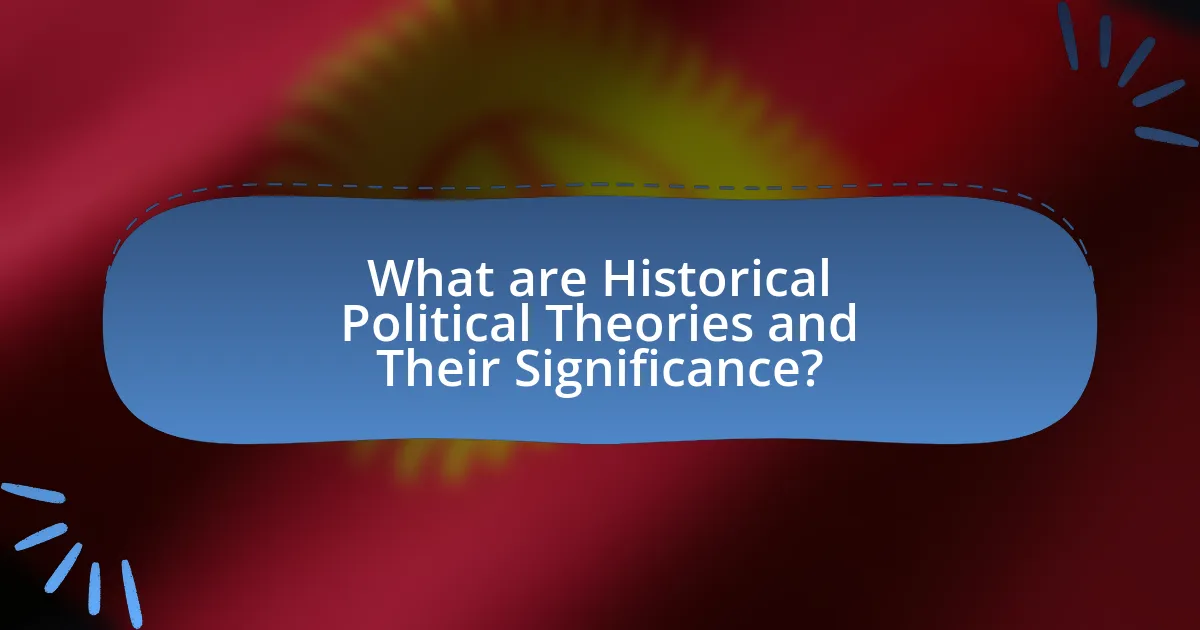
What are Historical Political Theories and Their Significance?
Historical political theories are frameworks developed by thinkers throughout history to explain, analyze, and guide political systems and governance. These theories, such as those proposed by Plato, Machiavelli, and John Locke, have significantly influenced contemporary governance models by providing foundational concepts like democracy, authority, and justice. For instance, Locke’s social contract theory laid the groundwork for modern democratic principles, emphasizing individual rights and government accountability. The significance of these theories lies in their ability to shape political ideologies, inform policy-making, and influence the structure of governments, thereby impacting societal organization and citizen engagement in political processes.
How have historical political theories shaped governance models?
Historical political theories have significantly shaped governance models by providing foundational concepts that influence political structures and practices. For instance, the social contract theory, articulated by philosophers like Thomas Hobbes, John Locke, and Jean-Jacques Rousseau, established the idea that governments derive their authority from the consent of the governed, which is a principle that underpins modern democratic systems. Additionally, the separation of powers, proposed by Montesquieu, has been integral in forming checks and balances within contemporary governance, ensuring that no single branch of government becomes too powerful. These theories have not only informed the development of constitutions and legal frameworks but have also guided the evolution of political ideologies such as liberalism, socialism, and conservatism, each shaping governance models in various historical contexts.
What key political theories emerged during the Enlightenment period?
Key political theories that emerged during the Enlightenment period include social contract theory, liberalism, and republicanism. Social contract theory, articulated by philosophers like Thomas Hobbes, John Locke, and Jean-Jacques Rousseau, posits that governments derive their authority from the consent of the governed, fundamentally shaping modern democratic thought. Liberalism, championed by thinkers such as John Stuart Mill, emphasizes individual rights, personal freedom, and limited government intervention, influencing contemporary political ideologies. Republicanism, as discussed by Montesquieu, advocates for a government system based on elected representatives and the rule of law, laying the groundwork for modern representative democracies. These theories collectively transformed governance models by prioritizing individual rights and the role of the state in protecting those rights.
How did the ideas of Machiavelli influence modern political thought?
Machiavelli’s ideas significantly influenced modern political thought by introducing the concept of realpolitik, which emphasizes pragmatic and often ruthless political strategies over moral or ideological considerations. His seminal work, “The Prince,” advocates for the use of power and manipulation to maintain authority, shaping contemporary views on leadership and governance. This approach has been reflected in various political practices, where leaders prioritize state stability and effectiveness, often at the expense of ethical norms. The enduring relevance of Machiavelli’s principles is evident in modern political discourse, where the balance between morality and power remains a central theme in the analysis of political behavior and strategy.
Why is it important to study historical political theories today?
Studying historical political theories is important today because they provide foundational insights into contemporary governance models and political ideologies. Historical political theories, such as those proposed by Plato, Machiavelli, and John Locke, have shaped modern concepts of democracy, authority, and individual rights. For instance, Locke’s theories on natural rights and government by consent directly influenced the development of democratic systems and human rights frameworks in the 18th and 19th centuries. Understanding these theories allows current policymakers and citizens to critically evaluate existing political structures and ideologies, fostering informed civic engagement and promoting the evolution of governance that reflects contemporary values and challenges.
What lessons can contemporary leaders learn from past political theories?
Contemporary leaders can learn the importance of governance structures and citizen engagement from past political theories. For instance, the social contract theory, articulated by philosophers like John Locke and Jean-Jacques Rousseau, emphasizes the necessity of mutual consent between the governed and the government, which remains relevant in modern democratic practices. Additionally, Machiavelli’s insights on power dynamics and the pragmatic use of authority highlight the need for leaders to balance ethical considerations with effective governance. Historical examples, such as the establishment of constitutional democracies following Enlightenment ideas, demonstrate how these theories have shaped current governance models, underscoring the value of accountability and rule of law.
How do historical political theories inform current political ideologies?
Historical political theories significantly shape current political ideologies by providing foundational concepts and frameworks that inform contemporary governance. For instance, the ideas of democracy articulated by ancient Greek philosophers like Plato and Aristotle continue to influence modern democratic systems, emphasizing the importance of civic participation and the rule of law. Additionally, Enlightenment thinkers such as John Locke and Jean-Jacques Rousseau introduced notions of individual rights and social contracts, which are integral to liberal ideologies today. These historical perspectives serve as reference points for evaluating and developing current political practices, ensuring that contemporary ideologies are rooted in established philosophical traditions.
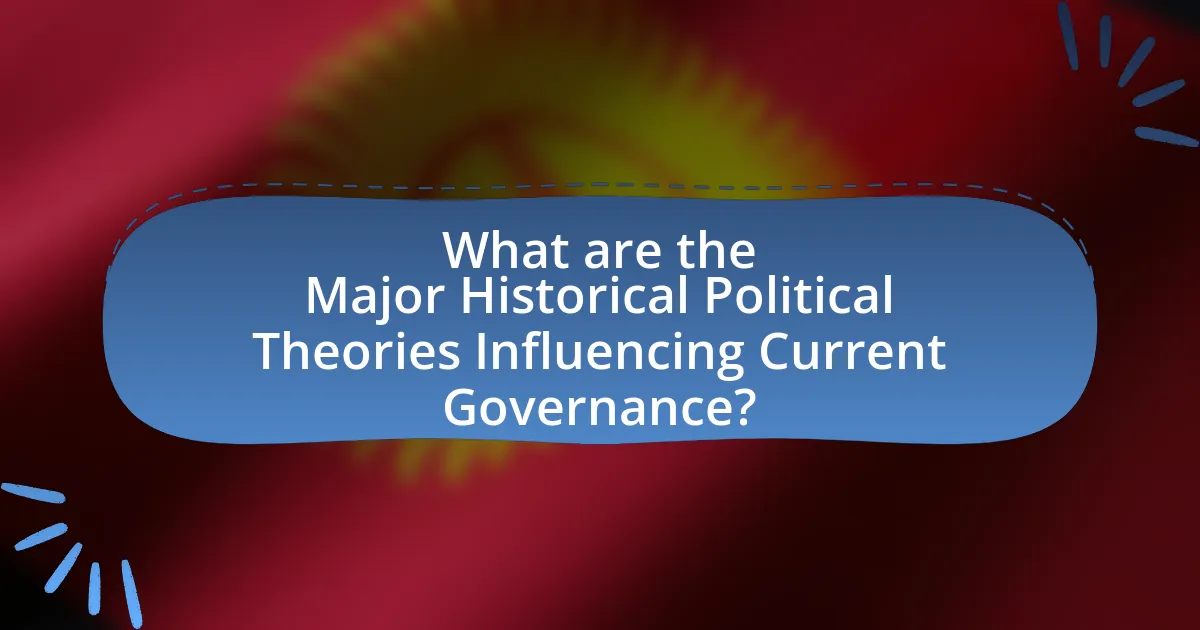
What are the Major Historical Political Theories Influencing Current Governance?
Major historical political theories influencing current governance include liberalism, conservatism, socialism, and democracy. Liberalism, rooted in the Enlightenment, emphasizes individual rights and freedoms, shaping modern democratic states. Conservatism, emerging as a reaction to liberalism, values tradition and social stability, influencing governance structures that prioritize continuity. Socialism advocates for collective ownership and economic equality, impacting welfare policies and state intervention in economies. Democracy, with its origins in ancient Greece, promotes participation and representation, forming the basis of many contemporary political systems. These theories have been foundational in developing governance models that reflect varying societal values and priorities.
Which political theories have had the most impact on modern governance?
Liberalism, socialism, and conservatism are the political theories that have had the most impact on modern governance. Liberalism emphasizes individual rights and freedoms, influencing democratic systems and human rights legislation globally. Socialism advocates for social ownership and egalitarianism, shaping welfare states and economic policies in various countries. Conservatism focuses on tradition and stability, affecting governance structures and policies that prioritize social order and continuity. These theories have shaped political discourse, policy-making, and institutional frameworks in contemporary governance, as evidenced by their foundational roles in constitutions and political parties worldwide.
What role does liberalism play in contemporary governance models?
Liberalism plays a crucial role in contemporary governance models by promoting individual rights, democratic principles, and market economies. This political theory emphasizes the importance of personal freedoms and equality before the law, which are foundational to many modern democratic systems. For instance, liberal democracies, such as those in Western Europe and North America, incorporate liberal values by ensuring civil liberties, free elections, and the rule of law, which are essential for political stability and social cohesion. Additionally, liberalism’s advocacy for free markets has influenced economic policies worldwide, leading to increased globalization and economic interdependence among nations. The effectiveness of liberal governance can be observed in the high levels of political participation and civil society engagement in these regions, demonstrating the enduring impact of liberal thought on contemporary political structures.
How does socialism influence current political systems?
Socialism influences current political systems by promoting policies aimed at reducing inequality and increasing social welfare. Many contemporary governments incorporate socialist principles, such as universal healthcare and public education, to address disparities in wealth and access to essential services. For instance, countries like Sweden and Norway implement extensive welfare programs funded by high taxation, reflecting socialist ideals. These systems demonstrate how socialist thought has shaped modern governance by prioritizing collective well-being over individual profit, leading to more equitable societies.
How do historical political theories manifest in current governance structures?
Historical political theories manifest in current governance structures through the adoption of democratic principles, social contracts, and the separation of powers. For instance, the Enlightenment thinkers, such as John Locke and Montesquieu, emphasized individual rights and the need for checks and balances, which are foundational to modern democratic systems like the United States Constitution. Additionally, concepts from Marxist theory influence contemporary discussions on social equity and economic systems, as seen in policies aimed at reducing income inequality in various nations. These historical frameworks continue to shape legislative processes, political discourse, and institutional designs, demonstrating their lasting impact on governance today.
What examples illustrate the application of historical theories in modern governments?
Modern governments apply historical theories through various frameworks, such as democracy, socialism, and liberalism. For instance, the democratic principles established by ancient Greek philosophers like Plato and Aristotle are evident in contemporary electoral systems, where representative democracy allows citizens to vote for their leaders. Additionally, the socialist theories of Karl Marx have influenced modern welfare states, where governments implement social safety nets and public services to address economic inequalities. The liberalism articulated by John Locke, emphasizing individual rights and limited government, is foundational in many Western democracies, shaping constitutions and legal systems that protect civil liberties. These examples demonstrate how historical political theories continue to inform and shape governance models today.
How do these theories affect policy-making today?
Historical political theories significantly influence contemporary policy-making by providing foundational frameworks that shape governance structures and decision-making processes. For instance, theories such as liberalism advocate for individual rights and limited government intervention, which inform policies promoting free markets and civil liberties. Additionally, Marxist theory critiques capitalism and emphasizes social equity, leading to policies aimed at wealth redistribution and social welfare programs. The impact of these theories is evident in the formulation of laws and regulations that reflect their principles, such as the establishment of social safety nets in welfare states, which are rooted in historical ideological debates.
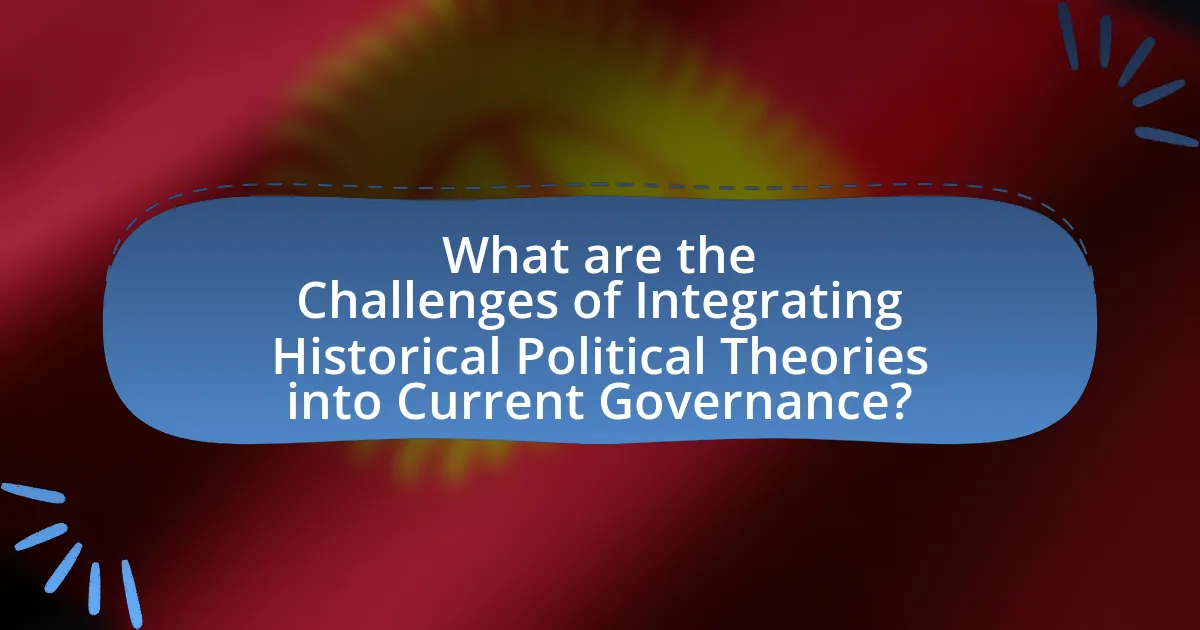
What are the Challenges of Integrating Historical Political Theories into Current Governance?
Integrating historical political theories into current governance faces several challenges, primarily due to contextual differences and evolving societal values. Historical political theories often reflect the specific socio-political conditions of their time, making direct application to contemporary governance problematic. For instance, theories developed during the Enlightenment, such as those by John Locke, emphasize individual rights and limited government, which may clash with modern governance models that prioritize collective welfare and social justice. Additionally, the complexity of today’s globalized world, characterized by diverse cultures and technological advancements, complicates the straightforward application of these theories. Historical theories may also lack relevance in addressing contemporary issues like climate change, digital privacy, and global inequality, which require innovative solutions beyond traditional frameworks. Therefore, the challenge lies in reconciling these historical perspectives with the demands of modern governance while ensuring that they remain applicable and effective in addressing current societal needs.
What obstacles do modern governments face when applying historical theories?
Modern governments face several obstacles when applying historical theories, primarily due to contextual differences, evolving societal values, and the complexity of contemporary issues. Historical theories often reflect the political, economic, and social conditions of their time, making direct application to today’s diverse and dynamic environments challenging. For instance, the principles of governance established during the Enlightenment may not adequately address modern concerns such as digital privacy, global warming, or social justice movements. Additionally, the interpretation of historical theories can vary widely, leading to conflicting applications and potential political polarization. These factors hinder the effective integration of historical insights into current governance models, as evidenced by the ongoing debates surrounding the relevance of classical political thought in addressing 21st-century dilemmas.
How do differing interpretations of historical theories create conflict in governance?
Differing interpretations of historical theories create conflict in governance by leading to divergent policy decisions and ideological divides among political leaders and parties. For instance, varying views on the principles of democracy, such as those articulated by John Locke versus Thomas Hobbes, can result in contrasting governance approaches—Locke’s emphasis on individual rights may foster liberal policies, while Hobbes’ focus on order may justify authoritarian measures. This ideological clash can manifest in legislative gridlock, public protests, and even civil unrest, as seen in the debates over the role of government in economic regulation, where historical interpretations of capitalism and socialism influence contemporary political discourse.
What are the risks of relying too heavily on historical political theories?
Relying too heavily on historical political theories can lead to misinterpretation of contemporary issues and ineffective governance. Historical theories often reflect the specific contexts and challenges of their time, which may not align with modern societal complexities. For instance, applying Machiavellian principles in today’s democratic societies can undermine ethical governance and public trust. Additionally, over-reliance on outdated theories can stifle innovation and adaptability, as seen in the failure of some governments to address current global challenges like climate change, which require new frameworks rather than rigid adherence to past ideologies.
How can governments effectively balance historical theories with contemporary needs?
Governments can effectively balance historical theories with contemporary needs by integrating foundational principles from historical political theories into modern policy frameworks. For instance, democratic ideals from Enlightenment thinkers like John Locke can inform contemporary governance by emphasizing individual rights and social contracts, which remain relevant in today’s discussions on civil liberties and governance structures. Additionally, the application of historical lessons, such as the failures of totalitarian regimes, can guide current policies to promote transparency and accountability, ensuring that governments do not repeat past mistakes. This approach is validated by the ongoing relevance of historical political theories in shaping modern democratic practices, as evidenced by the adoption of constitutional frameworks that reflect Enlightenment principles in many democratic nations today.
What strategies can be employed to adapt historical theories for modern governance?
To adapt historical theories for modern governance, one effective strategy is to critically analyze the core principles of these theories and assess their relevance to contemporary issues. This involves identifying key concepts from historical political theories, such as social contract theory or utilitarianism, and applying them to current governance challenges like social justice or environmental sustainability. For instance, John Locke’s ideas on individual rights can inform modern discussions on civil liberties and human rights protections. Additionally, integrating interdisciplinary approaches, such as insights from behavioral economics or sociology, can enhance the applicability of historical theories to today’s complex political landscape. By contextualizing these theories within modern frameworks, policymakers can create governance models that are both informed by historical insights and responsive to current societal needs.
How can leaders ensure that historical insights remain relevant in today’s political landscape?
Leaders can ensure that historical insights remain relevant in today’s political landscape by actively integrating lessons from past governance models into contemporary policy-making. This integration can be achieved through the analysis of historical case studies, which provide context for current challenges, such as the rise of populism or the impact of globalization. For instance, the principles of democratic governance established during the Enlightenment can inform modern democratic practices, helping leaders navigate issues like voter disenfranchisement. Additionally, leaders can foster educational initiatives that emphasize historical political theories, ensuring that both policymakers and the public understand the implications of past decisions on current governance. By doing so, leaders create a framework that not only respects historical context but also applies it to address present-day political dynamics effectively.
What practical steps can be taken to incorporate historical political theories into governance?
Practical steps to incorporate historical political theories into governance include integrating foundational principles from these theories into contemporary policy-making processes. For instance, utilizing concepts from John Locke’s social contract theory can guide the development of democratic frameworks that emphasize individual rights and government accountability. Additionally, applying Karl Marx’s critiques of capitalism can inform social welfare policies aimed at reducing inequality. Historical political theories can also be taught in educational curricula for policymakers, ensuring that future leaders understand the implications of these theories on current governance. Empirical evidence, such as the implementation of Locke’s ideas in the formation of modern democracies, supports the effectiveness of these approaches in enhancing governance.
How can educational programs enhance understanding of historical political theories among leaders?
Educational programs can enhance understanding of historical political theories among leaders by providing structured curricula that focus on critical analysis and contextual application of these theories. Such programs often include case studies, discussions, and simulations that allow leaders to engage with the material actively, fostering deeper comprehension. For instance, programs that incorporate the works of political theorists like Machiavelli or Rousseau enable leaders to explore the implications of these theories on contemporary governance. Research indicates that leaders who participate in educational initiatives that emphasize historical context are better equipped to apply theoretical insights to modern political challenges, as evidenced by studies showing improved decision-making skills among participants in such programs.
What role does public discourse play in integrating historical theories into current governance?
Public discourse plays a crucial role in integrating historical theories into current governance by facilitating dialogue and debate among citizens, policymakers, and scholars. This interaction allows for the examination and reinterpretation of historical political theories, such as those proposed by Machiavelli or Rousseau, in the context of contemporary issues. For instance, public discussions surrounding social contracts can influence modern governance structures by highlighting the relevance of consent and civic responsibility, as seen in democratic movements that draw on Enlightenment principles. Furthermore, empirical studies, such as those conducted by the Pew Research Center, indicate that public engagement in discourse leads to a more informed electorate, which is essential for the effective application of historical theories in policy-making.
